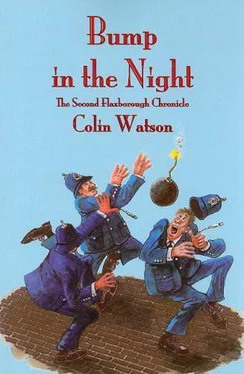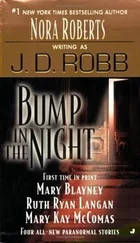Taking a hasty swig from his tankard of brandy and water, the editor spotted the new arrivals and beamed. “With you in a minute.” Then he penned, with the ease of long practice, three final unexceptionable sentiments, measured at a glance the total column-inchage, and thankfully screwed on the cap of his pen. “God bless us, every one,” he murmured and swept the envelopes into his pocket.
This action seemed to serve as a reminder. He delved into another pocket and withdrew a still damp print which he put down on the table before Payne and Hoole.
The optician pinched his lips and hummed nasally a little tune as he appraised the photograph. “I ought to know this ostentatious projectile.” He looked up. “It’s Biggadyke’s, isn’t it?”
Kebble nodded. “Look at the depth of focus,” he said enthusiastically. “Dead sharp.”
“What happened to Biggadyke, then?” Payne asked.
Kepple leaned towards him and pointed to parts of the picture. “He’s got every dent, has Harry. Every scratch. Look at that.”
“Yes, but what happened?” Payne repeated.
“Hit a lorry—you can’t touch the old focal-plane half-plate jobs. Heavy, but...God, see that fellow’s foot near the back wheel ? You could count the stitches in his socks.”
“I trust the lorry driver escaped injury,” said Hoole, anxiously.
Kebble wrenched his gaze from Harry’s achievement and picked up his tankard. “Oh yes, he’s perfectly alright.”
“What about Biggadyke, though?” Payne persisted.
“In hospital, they tell me,” He drank, then shook his head and frowned. “Those nurses must have a pretty rotten life.”
Hoole stared out of the window. In the gap between two warehouses a mast came briefly into view. “Tide time,” he dutifully observed.
Payne broke the silence that followed. “Didn’t I,” he asked Kebble, “see you in Jubilee Park this morning? With a policeman?”
“You did, old chap. I didn’t know you were there. That fellow Larch swoops about so. It’s like keeping up with someone on stilts. I say”—he poked his face forward and looked suddenly earnest—“who do you reckon did it?”
“Did what?” Hoole asked.
As Kebble described the outrage Hoole’s tight, smooth face gleamed with high amusement. “Oh God, the Snell cenotaph! Does she know?—No, of course she can’t; she was in my place just this morning.”
The editor grinned. “Once she does you’ll not see poor old Larch off the chain until he manages to arrest somebody.”
“That shouldn’t give him much difficulty,” said Payne. “Hasn’t Joe Mulvaney confessed yet?”
“Must have done,” said Hoole. “Unless he hasn’t heard about it.”
“Grope will have told him by now,” Kebble said.
“Well, then.”
The editor shook his head. “No, Joe’s been overdoing it lately. Claiming those Leicestershire stranglings was a bit too brown. Right out of his district.”
The trio prolonged the joke a little longer. None really believed that Joseph Terence Alloysius Mulvaney, cinema projectionist and slightly weak-minded victim of a sacrifice compulsion, would take credit for the Jubilee Park affair. It was just that he, together with versifying Grope and genially promiscuous Bess Egan and Edward Summerbine, fit-thrower, and Mavis Baggley, kleptomaniacal house-keeper of the town’s probation officer, and several more, were familiar bent coins in the social currency. They kept turning up among the loose change of conversation: droll reminders of life’s sportive possibilities.
Yet oddly enough, just as the talk in the Nelson and Emma had reverted to that morning’s road accident and Hoole was yielding to the temptation to tell a story about belladonna tincture, Mulvaney was doing precisely what had been so lightly predicted.
He was confessing, and to Chief Inspector Larch in person.
Larch had summoned the determined self-accuser into his office partly to deprive his staff of an opportunity for wasting time. But he had another reason. Like many of his kind, he allowed to percolate through his dislike of humanity in general a sentimental sympathy for freaks. He would allow Mulvaney to perform his act of sacrifice without the depressing indignity of conforming to a sceptical sergeant’s dictation speed.
Mulvaney, who had never recovered from the experience, in the first week of his apprenticeship, of seeing “The Informer” screened, sat hunched in his chair and scowled with pale obstinacy at Black-and-Tan Larch. In spite of the heat, he wore a long, tightly belted raincoat and kept his hands in its pockets.
“Sure and I don’t care if me poor body’s full of English bullets this night,” he was saying with a whining lilt that Larch found strangely soporific, “but not a word of treachery you’ll drag out of me. Haven’t I told you what happened, now? There was meself in it only, and that’s the holy truth.”
“You’ve not said why you did it, Mulvaney.”
Scorn blazed suddenly in Mulvaney’s big, gentle eyes. “Is it seriously you’re asking me that? You’ll be telling me next you’ve never heard of the annexation of Ireland!”
“Oh, of course,” Larch acknowledged.
“Or of the Organization? Let’s see if you’ll say you’ve never heard of the Organization?”
Larch let this irony pass.
Mulvaney stood up. He clicked his heels. “Very well; I’m ready.” He closed his eyes and added: “I suppose there’ll be a farce of a trial?”
The Chief Inspector also stood. “Er, no,” he said. “I can’t say that there will.”
A pained smile flickered over Mulvaney’s face. “Ah, yes. So it’s the cellar and the car’s backfire you’ll be having in mind, captain?”
Larch came round his desk, walked to the door and opened it. Mulvaney continued to stand blindly at attention. Then, hearing Larch cough, he opened his eyes.
He stared at the doorway, gave a quick, bitter laugh, and strolled carelessly towards the proffered freedom. “Ha! It’s the ambush, is it, after all?”
Larch nodded as he passed. “I’m afraid so. The cellar’s being re-decorated.”
Chapter Four
The obliteration of the Courtney-Snell memorial had no significant sequel for two weeks. It was reported, at considerable length and with biographies of everyone who could be remotely associated with it, in the following Friday’s issue of the Chalmsbury Chronicle . Police inquiries proceeded, of course, or were said to. Mrs Courtney-Snell quivered and threatened and enjoyed the solicitude of her peers. And small children in Jubilee Park went thirsty. That was all.
It was agreed to have been a queer affair, but not unduly alarming. As a topic it fell quickly to grade three.
And then, during the night of Tuesday, 17th June, there was a second explosion in Chalmsbury.
Councillor Pointer did not hear this one. It occurred more than a mile from his red brick villa in Holmwood and was not particularly loud, anyway. So Sergeant Worple’s successor on night duty remained undisturbed by the telephone and was able to leave the Occurrence Book fulfilling its proper function as a door stop.
The next morning two women happened to step simultaneously out of the front doors of their adjoining houses in Chapel Terrace. She who failed, by a split second, to start speaking before the other stood staring stonily across the road awaiting her chance to seize the conversational initiative. At first she gazed unseeing, intent only upon having ready a counter-stream of loquacity, but after a while she became aware that something in her line of vision was most curiously amiss. She grasped the second woman’s arm, shook her into silence, and exclaimed: “Look—his head’s gone!”
And so it had. Alderman Arnold Berry was no longer regarding the wide world with that straining-at-stool expression that denotes, in the convention of public sculpture, a man of high but unpopular principles. He was peering instead—or rather his head was—into a bed of wallflowers.
Читать дальше












